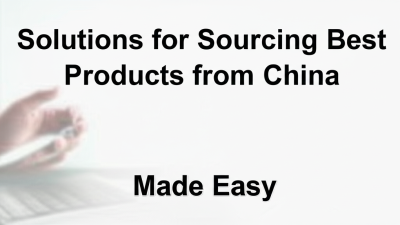
Solutions for Sourcing Best Products from China Made Easy
In today's global marketplace, China stands out as a leading source for a vast array of products, making it imperative for businesses to navigate its complexities effectively. Sourcing the best products from China can be a daunting task, given the diversity in manufacturing quality and the myriad of options available. However, by understanding the detailed technical specifications and adopting systematic approaches to sourcing, companies can streamline the process and uncover high-quality products that meet their specific needs.

This blog will delve into essential strategies, including how to evaluate product specifications and leverage best practices for procurement, ensuring that importing from China is not only easy but also immensely rewarding. Join us as we explore effective solutions for sourcing the best products from this dynamic market.
Evaluating Supplier Credibility: Key Metrics and Checks for Reliable Partnerships
When sourcing products from China, evaluating supplier credibility is paramount for establishing reliable partnerships. Recent industry reports indicate that nearly 30% of businesses encounter issues due to supplier incompetence, emphasizing the importance of thorough vetting processes. Key metrics such as production capacity, quality control certifications, and delivery timelines can serve as benchmarks for assessing a supplier's reliability. For instance, suppliers with ISO 9001 certification demonstrate a commitment to quality management, which can be a decisive factor in your selection.
Tip: Conduct on-site visits whenever possible. Seeing the production facilities firsthand can provide invaluable insights into the supplier’s operations and help you gauge their reliability.
Additionally, analyzing customer feedback and ratings on platforms like Alibaba or Made-in-China can provide a well-rounded picture of a supplier's track record. Reports show that companies that invest time in understanding supplier reviews are 50% more likely to form successful partnerships. Ensuring that your chosen supplier has a solid reputation in the industry will not only mitigate risks but also enhance long-term business sustainability.
Tip: Use third-party inspection services to verify product quality before shipment. This proactive step can prevent future disputes and ensure that the products meet your specifications.
Understanding Product Regulations: Navigating Compliance Standards in China
Navigating the compliance standards in China is essential for businesses looking to source products effectively. As the global market becomes increasingly rigorous in its regulatory requirements, understanding local product regulations is crucial. Recent developments, such as the introduction of the European Union's Battery Regulation, are a prime example of how foreign laws can impact Chinese manufacturers. This regulation not only emphasizes the need for environmentally sustainable practices but also increases the stakes for companies exporting to Europe. This highlights the importance of conducting thorough due diligence to ensure compliance with all regional standards.
Similarly, the EU Deforestation Regulation sets forth a framework aimed at reducing the impact of production and consumption on global deforestation. For companies sourcing products from China, this necessitates an understanding of the specific compliance measures required, such as the need for detailed supply chain investigations. Adherence to these new regulations will not only mitigate legal risks but can also be leveraged as a competitive advantage in international markets, allowing companies to align their sourcing strategies with global sustainability goals.
Leveraging Technology: Tools and Platforms for Efficient Product Sourcing
In today's fast-paced business environment, sourcing products from China has become increasingly streamlined, thanks in large part to advancements in technology. Various tools and platforms are revolutionizing how businesses connect with suppliers, providing efficient solutions that enhance the product sourcing process. According to a report by Statista, in 2022, over 70% of U.S. companies sourcing overseas turned to digital platforms to manage their procurement processes, showcasing the growing reliance on technology in global trade.
Platforms like Alibaba, Global Sources, and Made-in-China.com offer extensive databases of manufacturers and suppliers, allowing businesses to easily compare products and prices. The utilization of artificial intelligence (AI) and big data analytics also plays a crucial role in optimizing sourcing decisions. A recent analysis by McKinsey & Company highlighted that companies leveraging these advanced technologies could reduce their sourcing costs by up to 20%, thus enhancing their competitive edge in the market.
Additionally, tools such as automated sourcing assistants and supply chain management software contribute to faster response times and improved communication between buyers and suppliers. Research from the Boston Consulting Group indicates that organizations adopting these technologies are 50% more likely to secure better pricing and quality from suppliers. Embracing these technological solutions not only simplifies the sourcing process but also positions businesses for long-term success in the global marketplace.
Cost Analysis Strategies: Balancing Quality and Affordability in Chinese Products
When sourcing products from China, companies often face the challenge of balancing quality with affordability. According to a report by Statista, the average manufacturing cost in China is approximately 30% lower than in Western countries, making it a prime location for cost-effective production. However, companies must be cautious; focusing solely on price can lead to compromised quality. A study by Quality Inspection points out that 25% of products sourced from China fail quality control checks, which can significantly impact brand reputation and customer satisfaction.
To effectively balance quality and affordability, businesses should implement comprehensive cost analysis strategies. This includes not only evaluating the price per unit but also understanding the total landed cost, which factors in shipping, duties, and potential quality control expenses. A survey from Deloitte suggests that companies that invest in supplier quality audits report a 20% reduction in product defects over time. By adopting such strategies, firms can ensure they are sourcing high-quality products at competitive prices, ultimately leading to better long-term profit margins and customer loyalty.
Shipping and Logistics: Streamlining Processes for Timely Delivery from China
When sourcing products from China, effective shipping and logistics play a crucial role in ensuring timely delivery. Understanding the nuances of international shipping can significantly streamline the process, making it easier for businesses to manage their supply chains. Utilizing reliable freight forwarders is one way to simplify logistics. These experts can provide valuable insights into the best shipping routes, necessary documentation, and customs regulations, helping to alleviate the complexities involved in importing goods.
Additionally, leveraging technology can enhance the efficiency of shipping processes. Many companies are now using software solutions that allow them to track shipments in real-time, manage inventory effectively, and predict delivery times with greater accuracy. By automating these tasks, businesses can save time and reduce the likelihood of errors. Communication is also key; maintaining an open dialogue with suppliers and logistics partners ensures that everyone is on the same page, which is essential for avoiding delays and misunderstandings. This approach not only boosts operational efficiency but also builds stronger partnerships in the long run.
